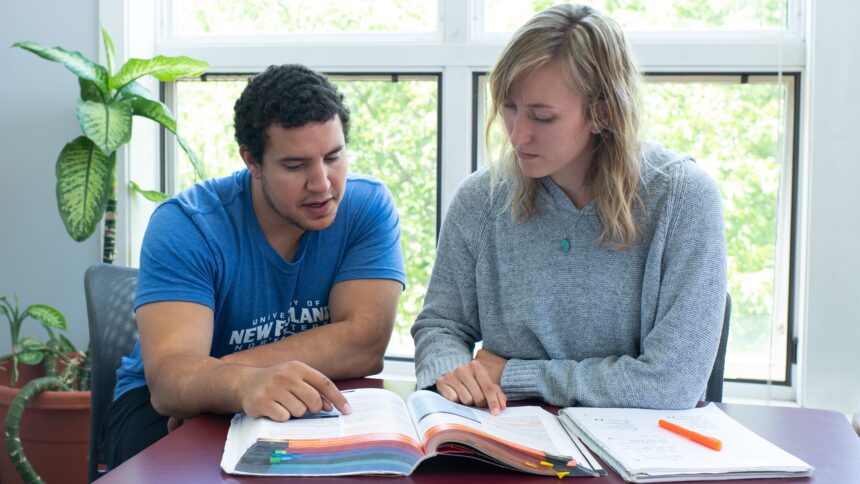Description | Survey | Reading Log Template | Curriculum | Grading
Welcome to UNE
What Every First-Year Nor’Easter Needs to Know
Description

In Reading Lab, students practice the advanced reading strategies they’ll need to read the more complex texts typically assigned in college courses and used in professional occupations. They develop knowledge of and fluency in the high impact reading practices used by experts to read, understand, and make use of texts.
Reading Lab instructors work with each student once a week for forty-five minutes. Sessions focus on readings assigned in their other UNE courses. At the end of Reading Lab, students should have the confidence to tackle any reading assignment they’ll face in their first two years of college.
Reading Lab is a core component of SAS 030: Opportunities for Success (syllabus)
Our Reading Lab works by engaging students on all four dimensions of reading.

Survey
Start of the Semester Reading Survey (by Megan Grumbling)
Reading Log Template
Reading Log Template (by Megan Grumbling)
Curriculum
- Active Reading Process
- Previewing
- Chunking
- Annotation
- Graphic Organizers for Common Text Structures/Reading
- Peer Reading and Collaborative Summary Activities (great for study groups)
- Summary/Paraphrase
- Using Learning Objectives in Cornell Notetaking
- Supercharge Your Academic Reading By Focusing on Concepts
- Simplify Complex Sentence Structures for Better Comprehension
- Informal Writing to Understand & Connect
- Describing Your Reading Difficulty
- Reader’s Workbench
- Question and Answer Relationships (QAR)
- What it Says/What it Does
- Approaches to New/Academic Vocabulary
Other Resources
- Excelsior Online Reading Lab
- Allison J. Head, “Reading in the Age of Distrust” – The ability to read analytically and deeply should be one of the most important takeaways from college. But are educators equipping students with the skills they need for today?
Grading
Reading Lab is worth 15% of your grade in SAS 030 Opportunities for Success.
Your Reading Lab grade is based on your presence, preparation, and engagement in Reading Lab class sessions.
- Students who earn an A in Reading Lab will tend to
- Attend at least 12 of 14 Reading Lab sessions with their Reading Lab instructor
- Consistently attempt reading assigned in target classes before attending Lab
- Consistently have readings and other course materials in their possession during Lab
- Consistently be an active participant in Lab activities
- Consistently experiment with and implement reading strategies suggested by their Reading Lab instructor
- Develop a sense of agency and ownership about what aspects of their reading and work on in Lab sessions and enthusiastically use the opportunity to develop the aspects of their reading and writing suggested by their Reading Lab instructor
- Students who earn a B in Reading Lab will tend to
- Attend at least 10 of 14 Reading Lab sessions with their Reading Lab instructor
- Often attempt reading assigned in target classes before attending Lab, with the exception of just a few sessions
- Often have readings and other course materials in their possession during Lab, with the exception of just a few sessions
- Often be an active participant in Lab activities, with the exception of just a few sessions
- Often experiment with and implement reading strategies suggested by their Reading Lab instructor
- Make good use of the opportunity to develop the aspects of their reading skills suggested by their Reading Lab instructor
- Students who earn a C in Reading Lab will tend to
- Attend at least 8 of 14 Reading Lab sessions with their Reading Lab instructor
- Sometimes attempt reading assigned in target classes before attending Lab, more often than not
- Sometimes have readings and other course materials in their possession during Lab, more often than not
- Sometimes be an active participant in Lab activities, more often than not
- Sometimes experiment with and implement reading strategies suggested by their Reading Lab instructor
- Sometimes use of the opportunity to develop the aspects of their reading skills suggested by their Reading Lab instructor
- Students who earn a D in Reading Lab will tend to
- Attend at least 8 of 14 Reading Lab sessions with their Reading Lab instructor
- Attempt reading assigned in target classes before attending Lab in fewer than half of the Lab sessions
- Have readings and other course materials in their possession during Lab in fewer than half of the Lab sessions
- Be an active participant in Lab activities in fewer than half of the Lab sessions
- Rarely experiment with and implement reading strategies suggested by their Reading Lab instructor
- Rarely use of the opportunity to develop the aspects of their reading skills suggested by their Reading Lab instructor
- Students who earn an F in Reading Lab will tend to
- Attend fewer than 8 of 14 Reading Lab sessions with their Reading Lab instructor
- Very rarely read assigned in target classes before attending Lab
- Very rarely have readings and other course materials in their possession during Lab
- Very rarely be an active participant in Lab activities
- Very rarely experiment with and implement reading strategies suggested by their Reading Lab instructor
- Very rarely use of the opportunity to develop the aspects of their reading skills suggested by their Reading Lab instructor
![SASC - Student Academic Success Center - UNE [logo]](https://s3.amazonaws.com/files.uneportfolio.org/wp-content/uploads/sites/5/2022/02/SASCLogoSquare_Smaller-3-e1644936452801.jpeg)